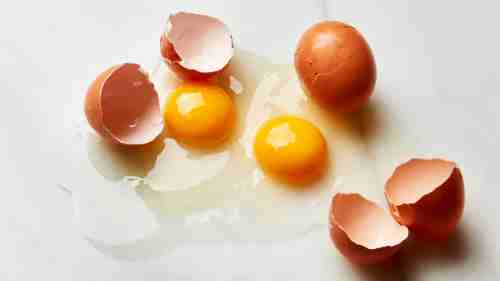Eggs contain very few calories; however, this number varies based on the size of the eggs and what you cook eggs with. They are rich in nutrients that cannot be obtained from other foods, such as vitamin D.
Eggs are an extremely versatile and highly adaptable food. From poaching to scrambling, several ways to prepare an egg, depend on your preferences.
Although they are often a sought-after breakfast item, they add great to lunch and dinner dishes such as soups, salads, stir-fries, sandwiches, and many more.
If you are a frequent consumer of eggs, you may wonder what their calories and nutritional value are. This article will provide all the information about the egg’s nutritional profile.
Nutrition Facts

Eggs that have been hardboiled are packed with proteins, nutrients and fats. One large hardboiled egg (50 grams) provides:
- Calories: 77
- Carbs: 0.6 grams
- Total fat content: 5.3 grams
- Saturated fats: 1.6 grams
- Monounsaturated Fat: 2.0 grams
- Cholesterol is 221 mg
- Protein: 6.3 grams
- Vitamin A: 6 per cent of the recommended Dietary Allowance (RDA)
- Vitamin B2 (riboflavin) 15 per cent of the RDA
- Vitamin B12 (cobalamin) 9percent of the RDA
- The phosphorus content is 86 milligrams, which is 9% of the RDA
- Selenium 15.4 milligrams, or 22.2 per cent of RDA
With all the nutritional value eggs can provide, eggs are an incredibly healthy food that is low in calories. Hardboiled eggs contain just 77.5 calories, five grams of fat, and extremely low carbs.
Also, they’re a great protein source, around 6 grams of protein per egg.
Additionally, eggs contain an array of amino acids. That implies that they’re a total protein source.
Eggs cooked in hardboiled form also provide essential nutrients like zinc, vitamin D, calcium, and all the B vitamins. They’re excellent riboflavin (vitamin B2) and vitamin B12 sources.
How many calories are in an egg?
The calorie content of an egg is contingent on the size of the egg. Protein’s power is evident when eggs are considered a complete protein source. They include all the essential amino acids your body requires for proper functioning.
Based on the food data central findings, a tiny egg contains 54 calories for 50 grams.
Extra large eggs also offer 90 calories for each 50g of egg. Keep in mind that this is an egg that is plain with no additional ingredients. Incorporate butter or oil into the frying pan, which will add calories.
Protein in Egg Yolk
Egg yolks have more protein-rich calories than eggs with whites. Large eggs (17 grams) provide 56 calories in their yolk, while 18 calories are available for the white.
What influences the Calories In Eggs?

In the beginning, we observed that, on average, a medium egg contains 65 calories. However, this is only an approximate estimation, as numerous factors affect the amount of calories in eggs. Therefore, let’s dig further into the subject and determine the aspects.
Size: As we mentioned previously, Eggs with larger sizes are typically higher in nutrients than eggs with smaller. It’s around 20 calories.
Egg white Egg white. Egg yolk There’s an important difference in the macronutrients in the two components. While a white contains only 17 kcal, the egg yolk is high in fats and is, therefore, more calorie-dense (ca. 57 kcal).
The diet of the chicken It is surprising that the diet of the bird that laid the egg could affect the egg’s nutritional value. Chickens provided with a healthy diet will tend to lay eggs that have more nutritional value, specifically when it comes to levels of omega-3.
The cooking method is most likely why it will most affect the amount of egg’s calories. If poached or cooked eggs are prepared without ingredients, scrambles or eggs are usually cooked with fats and oil. Given that a teaspoon of olive oil contains more than 120 kcal, calories in your food will surely skyrocket.
Calories In An Egg By Preparation Method
In the preceding paragraph, we’ve seen that one factor that most influences the nutritional value is the manner of cooking. Simple cooking methods, like steaming or boiling, are less heavy than cooking eggs in cheese or oil.
A general outline of the approximate calories of an egg based on the most common preparation methods. It’s important to note that this information refers to large eggs since it is the standard size used in recipes.
Large boiled egg: A cooked egg is a good source of 72 to 76 calories, provided it is cooked with any additional fats.
Poached egg: A big poached egg contains between 72 and 76 calories when cooked with no extra fats.
Fried eggs: Because most eggs are made from butter or oil, A large fried egg typically has 90 to 100 calories. The number could quickly rise when large quantities of fats are consumed.
Scrambled eggs: Typically, the scrambled egg has 100 or 120 calories, depending on the method you use to prepare the egg. If scrambled with a lot of oil or butter, the calorie count could quickly double or even triple.
Omelette: Estimating the omelette’s calories is difficult because this dish is typically prepared with other ingredients, such as cheese oil, ham and cheese. Omelettes made with two eggs without fillings could have 140-160 calories. However, omelettes packed with ham, cheese and cheese could be more than 300 kcal!
Egg whites: If you consume just the white and not the yolk, it’ll contain just 17 calories (if cooked non-fat).
What are the health benefits of eggs?
Eggs are regarded as one of the most nutritious food sources that you can find. In addition to being a great source of protein, they are packed with minerals, vitamins and fats that are healthy and improve the wellbeing of your body. The top advantages of eggs for your health:
The complete source of protein: Eggs are among the very few food sources rich in the nine amino acids essential to life, which are the basic protein building blocks vital for healing muscle tissue, boosting the immune system and creating hormones and enzymes within the body. Furthermore, the protein in eggs helps keep you fuller for longer and prevents you from overeating.
Protein of high quality: Besides being a full source of protein, egg proteins are of high biological value. It means that amino acids are absorbed efficiently and used by the body.
Vitamins The yolk is high in vitamins essential to life, like vitamin A and vitamin D. It also contains vitamin E and a variety of B vitamins (B12 Folate, riboflavin and B12).
Minerals: Besides the vitamins in eggs, egg yolks (especially yolks) provide a great source of minerals, including iron, phosphorus, and selenium. Additionally, eggs contain the nutrient choline, which is vital to brain health, nerve function, and the synthesis of neurotransmitters.
Healthy fats: Though higher in calories, it is best to avoid the yolks. It is a rich source of healthy unsaturated fats. These can be beneficial to cardiovascular health. They can also aid in reducing the likelihood of suffering from cardiovascular diseases.
Eggs that are low in carbohydrates contain many carbs, making them an ideal food choice for those on low-carb and keto-friendly diets.
The Side Effects of Consuming Eggs Everyday
If you eat a lot of eggs in one go, the stomach could hurt or trigger gastric upset. Some people experience discomfort even after eating eggs for lunch or brunch. If you are unaware of a food allergy or egg sensitivities, it could cause you to suffer more discomfort.
A majority of people don’t need to fret about eating eggs. However, people with accent gene variants might be susceptible to increasing their cholesterol levels if they eat more eggs.
In the end, how many Calories are in an Egg?
Around 70 calories per egg, egg can be a fantastic ingredient to add to your daily diet. Eggs are a great source of protein that is high quality, nutritious fats, vital minerals and vitamins.
There are several factors to consider to determine the amount of calories contained in eggs. The size, the yolk’s weight and white. White, the diet of the chicken, and ways to cook the egg off. Cooking with butter or oil can drastically alter the nutritional content when boiling an egg doesn’t provide extra calories. When cooking eggs, choose easy preparation methods, such as cooking or boiling.